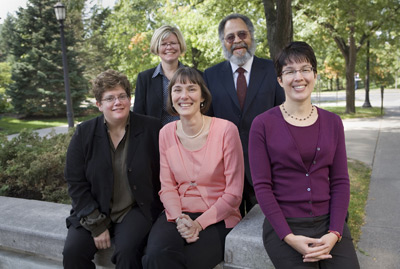Cornell launches $3.3 million NSF program to build 'critical mass' of women faculty in engineering and sciences
By Bill Steele

To increase the number of women faculty in engineering and the sciences, Cornell will use a $3.3 million grant from the National Science Foundation (NSF) to work on recruiting, retaining and promoting more women in leadership positions. The grant also will create a new center called ACCEL (Advancing Cornell's Commitment to Excellence and Leadership), which on Nov. 1 will become a permanent part of the Provost's Office.
"We have an important opportunity to increase the number of women science and engineering faculty," said Cornell Provost Carolyn A. "Biddy" Martin. "We want a critical mass of women in each department, the environment that most determines faculty daily life."
To correct the current imbalance, Cornell has set ambitious goals: to reach a level of 20 percent women faculty in each science and engineering department in the next five years, and to have more than 30 percent by 2015, Cornell's sesquicentennial. At present, about half, or 27 of 51 science and engineering departments, fall below 20 percent, and some departments have no women faculty.
ACCEL will lead four initiatives:
- The Climate Initiative will focus on departmental cultures, seeking to build awareness of gender issues among the faculty by training department chairs, providing orientation for new faculty and bringing speakers to campus to discuss gender issues.
- The Recruiting Initiative will focus on all stages of hiring, seeking to increase the number of applications from women, the number of women interviewed and the number of offers.
- The Women's Power Tools Initiative will focus on women who are already on the faculty, supplying them with information, resources and opportunities to help them move into leadership positions.
- Monitoring and Evaluation will track the effectiveness of the new policies. It will include a longitudinal study by Shelley Correll, associate professor of sociology, that will follow both pre- and post-tenure professors through their careers, trying to identify barriers and see if they are different for men and women.
Although the focus of the NSF grant is on women in engineering and the physical, life and social sciences, organizers of the new center hope for a "ripple effect" that will enhance the lives and careers of both men and women faculty throughout the university.
As the only Ivy League university that was coeducational almost from its beginnings, Cornell has a rich history of including women in all areas and can point to many firsts for women in higher education, but it still needs to increase the representation of women in its faculty, Martin said.
Martin is principal investigator on the grant, with co-principal investigators Robert Harris Jr., vice provost for diversity and faculty development; Marjolein van der Meulen, associate professor of mechanical and aerospace engineering; Sheila Hemami, associate professor of electrical and computer engineering; and Correll. Hemami, van der Meulen and Correll will rotate as directors of ACCEL.
"The student body is changing," said Harris, "but that's not yet reflected in the faculty." Part of the solution, he said, is to remove subtle -- and sometimes not so subtle -- barriers to women that have become part of departmental cultures over the years. "It's not as though anyone is consciously or deliberately trying to block the progress of women," Harris explained, "but there are attitudes that have become inbred."
The NSF grant is an Institutional Transformation Award under the agency's ADVANCE program, whose goal is to transform the institutional environment for women faculty in science and engineering nationwide.
"With a National Science Foundation Advance grant, Cornell can renew its leadership by demonstrating that reaching a critical mass of women scientists at an elite, research-intensive university is not only possible, but critical to the quality of the institution," said Martin. "The presence of greater numbers of female faculty at Cornell will have a transformational impact at a national level."
NSF program addresses national need
Although more women are pursuing science and engineering careers than in the past, women constitute only 25 percent of the science and engineering workforce at large, and less than 21 percent of science and engineering faculty at four-year colleges and universities, according to NSF statistics. Women from minority groups represent about 2 percent of science and engineering faculty in four-year colleges and universities.
The NSF ADVANCE program arose from a 1999 Massachusetts Institute of Technology study that examined ways to improve recruitment, retention and promotion of women in engineering and the sciences.
NSF-funded programs at several other universities have produced major changes. The University of Michigan, for example, reports that over the first three years of its program, 15 women were hired each year, compared with three to five women previously.
Get Cornell news delivered right to your inbox.
Subscribe